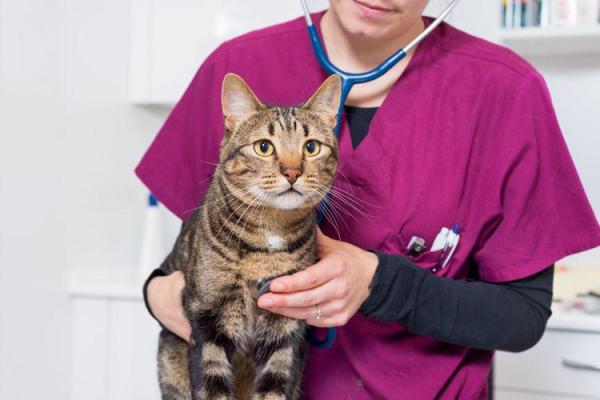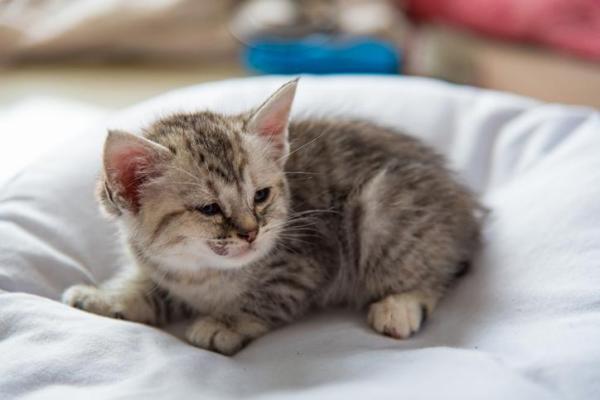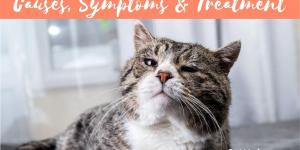My Cat Has Diarrhea and Vomiting



See files for Cats
Vomiting and diarrhea in cats are symptoms of many different health disorders. They can often happen on their own, but even the two occurring together can be relatively common. While the problem may not be a serious one, vomiting and/or diarrhea in cats is a sign of a problem. To gauge whether this problem is a serious threat to their health, their overall clinical picture and concurrent symptoms need to be examined. This is something we can look out for, but many issues will require a qualified veterinarian to confirm a diagnosis.
If you see that your cat has diarrhea and vomiting, it is understandable you will be worried. AnimalWised looks at the possible causes of these symptoms and what treatment options are available. We also look how these symptoms might present in kittens.
Causes of vomiting and diarrhea in cats
In this section, we are going to look at the reasons adult cats have diarrhea and vomiting. We will look at the presence of these symptoms in kittens at the end of the article. In general, when a cat has diarrhea and vomiting at the same time, it is symptomatic of a gastrointestinal or digestive problem. However, just because the symptoms present in the gastrointestinal tract doesn't mean the root cause is a digestive issue. Here are some of the varied reasons your cat may have diarrhea and vomiting at the same time:
- Change in diet: all cats need certain nutritional requirements, but not all requirements are the same. If you change your cat's diet, they may not get the nutrition they need and vomiting and/or diarrhea may be the result.
- Allergies: similar to a change in diet, there may be something your cat is unable to digest as it causes an allergic reaction. If this occurs, gastrointestinal issues are likely. The severity of the symptoms depends on the severity of the allergy and the amount of allergen which was consumed.
- Hairballs: the scientific name for a hairball is a trichobezoar. It is caused by the ingestion of hair during grooming and is more common in longhaired cats. The cat will often vomit up the hairball, but the gastrointestinal obstruction can lead to concurrent diarrhea. The problem should resolve on its own and severe blockage is unlikely, but take the cat to the vet if they have other worrying symptoms.
- Stress: when a cat is very stressed, physical symptoms can manifest. Diarrhea and vomiting do not seem directly linked to mental well-being, but they are. They will also likely display other symptoms such as excessive grooming or defecating outside the litterbox.
- Bacterial infection: if the cat has eaten something they shouldn't or they have been infected by an external factor, bacteria can enter the body. This type of infection can cause diarrhea and vomiting, the severity of which will depend on how bad the infection is.
- Viral infection: a viral infection can also lead to vomiting and diarrhea at the same time, especially if it leads to gastroenteritis.
- Internal parasites: external parasites can indirectly cause vomiting and diarrhea as they are a vector for viral and bacterial infection. However, internal parasites can reside in the actual gastrointestinal tract and lead to vomiting and diarrhea.
- Inflammatory bowel disease: if vomiting and diarrhea is chronic, it could be due to a chronic disease such as inflammatory bowel disease. IBS can have various causes of its own, including stress, lack of dietary fiber or any change to colon health. The diarrhea and vomiting symptoms may not be severe, but they may be persistent, so it is very important you take the cat for clinical tests.
- Kidney disease: since the kidneys are part of the digestive system, problems with the kidneys can lead to vomiting and diarrhea. This can be a gradual issue but flare ups can occur. Will need a veterinary diagnosis.
- Poisoning: if the cat become intoxicated by eating something which they shouldn't have, e.g. cleaning products or human food toxic to cats. If a serious case of intoxication occurs, then you will need to take the cat to the vet and it may be a medical emergency.
There are other factors which can lead to diarrhea and vomiting in cats, but the above are the most common. You will also need to look out for different symptoms which may accompany them. Dehydration or fever are particularly important to keep an eye out for. This is because they are indicators of serious medical problems.
Similarly, the color of the cat's vomit and diarrhea will help a veterinarian achieve a diagnosis. For example, if they vomit up a blue substance it is possible they have ingested something toxic. If you want to know more, this article on whether a cat's feces is normal can help.
Treatment of vomiting and diarrhea in cats
An episode of vomiting and diarrhea with no other symptoms usually resolves itself after a short while without any need for treatment. However, if the problem persists, treatment will depend on the underlying cause rather than treating the symptoms of diarrhea and vomiting. For example if the problem is gastroenteritis or a viral infection, then the treatment may require antibiotics. Additional treatment may be required in the form of anti-inflammatory medication to reduce swelling.
If the symptoms of diarrhea and vomiting are caused by a parasitical infestation, then this will need to be treated. Antiparasitic drugs will need to be administered, but it will also be advisable to treat the cat with a preventive deworming schedule once the problem has been cleared.
Fluid therapy may be required as an additional treatment. This is especially the case when the cat has become dehydrated for whatever reason or they are so sick they are unable to eat or drink. This will need to be carried our intravenously under the supervision of a professional, so they will need to be taken to a veterinary hospital.
For chronic issues such as IBS, a detailed examination and diagnosis will be required. For other complex issues related to diarrhea and vomiting such as renal failure, blood tests and other diagnostic tools will be required. Unfortunately, although kidney disease can be stopped, it is irreversible and treatment will come in the form of lifestyle management, specifically diet and exercise. Even if a chronic disease is not diagnosed, a special diet for cats with diarrhea may be helpful.
By looking at the concurrent symptoms and the recurrence of vomiting and diarrhea, we can tell whether we need to take the cat to the veterinarian. In general, if the problems do not improve within 24 hours or if they become lethargic, you should take them to the veterinarian immediately.

Home remedies for vomiting and diarrhea in cats
Once we have determined the cause of a cat's diarrhea and/or vomiting, we need to prevent it from happening again. For example, if the problem was caused by ingesting our leftovers, we need to ensure they do not have access to food which can cause them harm. In milder cases such as an upset stomach, it may be sufficient to simply remove food for a few hours and let them settle.
When we talk about home remedies for diarrhea and vomiting in cats, it's important to stipulate there is no quick fix. We need to have a proper diagnosis and follow a veterinarian's advice. However, home remedies can help to supplement this treatment, as long as it doesn't contradict it. Diet is the best home remedy for this problem.
A piece of plain cooked chicken or fish (without bones) can help return their digestive system to health. Warm (not hot) food can also help make the food more appetizing after they have had a bout of vomiting and diarrhea. More fiber once the cat returns to their normal diet may also be useful. If you do not already replace their water several times a day, it is a good habit you should get into.
After a day or two, the cat should be able to move on to their regular food without vomiting or diarrhea returning. If there is a disease or situation which has triggered the problem, then we need to ensure we don't contradict the treatment, so check with your vet first.
Vomiting and bloody diarrhea in cats
If vomiting and diarrhea in cats is accompanied by blood, then we need to consider it a veterinary emergency. Mild poisoning can cause an upset stomach, but severe poisoning can lead to toxic shock. If this is the case, immediate clinical intervention is imperative. The presence of blood in vomit or stool can also be a symptom of an underlying chronic illness such as panleukopenia.
A viral disease such as this is life-threatening, especially in unvaccinated kittens where this disease is most prevalent. In addition to bloody diarrhea and vomiting, this diseases presents dehydration, lethargy, depression and fever. Hospitalization is required to manage these symptoms and bring their health back to a stable level. Prognosis depends on the individual case.

Vomiting and diarrhea in kittens
When a kitten has vomiting and diarrhea, it is always a matter of veterinary consultation. This is because a kitten's health status is already very vulnerable due to an underdeveloped immune system. If a kitten loses more fluids than they can replace, the rapid dehydration can be fatal. Additionally, kittens with vomiting and diarrhea may have a parasitical infestation. Due to their vulnerability, they will be less likely to withstand the effects of parasites when compared to an adult cat.
It is important cats are wormed regularly, beginning when they are a kitten. Worming products to prevent parasites should be administered from 15 days of life and then updated regularly throughout the remainder of their lives. If we adopt or rescue a kitten and are unsure if they have been wormed, we need to take them to the veterinarian to check. They will also be able to run diagnostics to see if the cat has an infestation, but they may require a stool sample for this.
It is important we do not worm a cat on our own if they have vomiting and diarrhea. We may further irritate their digestive system if we do. A veterinarian will be able to prescribe the appropriate treatment. This may include antibiotics if the problem is due to parasites such as giardias.

This article is purely informative. AnimalWised does not have the authority to prescribe any veterinary treatment or create a diagnosis. We invite you to take your pet to the veterinarian if they are suffering from any condition or pain.
If you want to read similar articles to My Cat Has Diarrhea and Vomiting, we recommend you visit our Other health problems category.
- Sagarra, Natalia. 2016. Food in gastrointestinal processes. Ateuves 31. 14-17.







